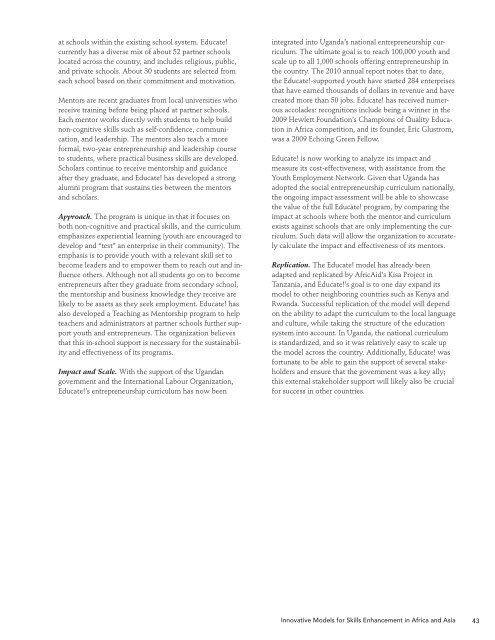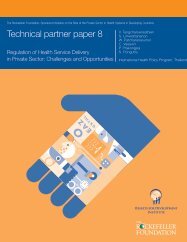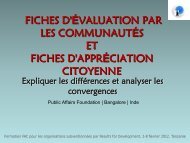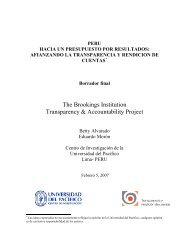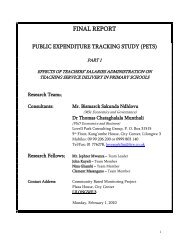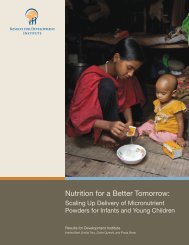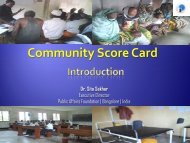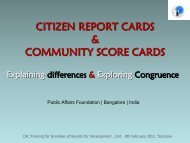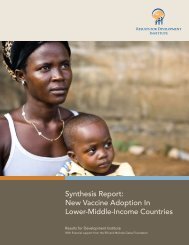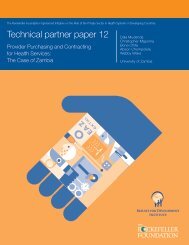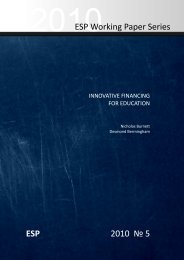Innovative Secondary Education For Skills Enhancement
Innovative Secondary Education For Skills Enhancement
Innovative Secondary Education For Skills Enhancement
You also want an ePaper? Increase the reach of your titles
YUMPU automatically turns print PDFs into web optimized ePapers that Google loves.
at schools within the existing school system. Educate!<br />
currently has a diverse mix of about 52 partner schools<br />
located across the country, and includes religious, public,<br />
and private schools. About 30 students are selected from<br />
each school based on their commitment and motivation.<br />
Mentors are recent graduates from local universities who<br />
receive training before being placed at partner schools.<br />
Each mentor works directly with students to help build<br />
non-cognitive skills such as self-confidence, communication,<br />
and leadership. The mentors also teach a more<br />
formal, two-year entrepreneurship and leadership course<br />
to students, where practical business skills are developed.<br />
Scholars continue to receive mentorship and guidance<br />
after they graduate, and Educate! has developed a strong<br />
alumni program that sustains ties between the mentors<br />
and scholars.<br />
Approach. The program is unique in that it focuses on<br />
both non-cognitive and practical skills, and the curriculum<br />
emphasizes experiential learning (youth are encouraged to<br />
develop and “test” an enterprise in their community). The<br />
emphasis is to provide youth with a relevant skill set to<br />
become leaders and to empower them to reach out and influence<br />
others. Although not all students go on to become<br />
entrepreneurs after they graduate from secondary school,<br />
the mentorship and business knowledge they receive are<br />
likely to be assets as they seek employment. Educate! has<br />
also developed a Teaching as Mentorship program to help<br />
teachers and administrators at partner schools further support<br />
youth and entrepreneurs. The organization believes<br />
that this in-school support is necessary for the sustainability<br />
and effectiveness of its programs.<br />
Impact and Scale. With the support of the Ugandan<br />
government and the International Labour Organization,<br />
Educate!’s entrepreneurship curriculum has now been<br />
integrated into Uganda’s national entrepreneurship curriculum.<br />
The ultimate goal is to reach 100,000 youth and<br />
scale up to all 1,000 schools offering entrepreneurship in<br />
the country. The 2010 annual report notes that to date,<br />
the Educate!-supported youth have started 284 enterprises<br />
that have earned thousands of dollars in revenue and have<br />
created more than 50 jobs. Educate! has received numerous<br />
accolades: recognitions include being a winner in the<br />
2009 Hewlett Foundation’s Champions of Quality <strong>Education</strong><br />
in Africa competition, and its founder, Eric Glustrom,<br />
was a 2009 Echoing Green Fellow.<br />
Educate! is now working to analyze its impact and<br />
measure its cost-effectiveness, with assistance from the<br />
Youth Employment Network. Given that Uganda has<br />
adopted the social entrepreneurship curriculum nationally,<br />
the ongoing impact assessment will be able to showcase<br />
the value of the full Educate! program, by comparing the<br />
impact at schools where both the mentor and curriculum<br />
exists against schools that are only implementing the curriculum.<br />
Such data will allow the organization to accurately<br />
calculate the impact and effectiveness of its mentors.<br />
Replication. The Educate! model has already been<br />
adapted and replicated by AfricAid’s Kisa Project in<br />
Tanzania, and Educate!’s goal is to one day expand its<br />
model to other neighboring countries such as Kenya and<br />
Rwanda. Successful replication of the model will depend<br />
on the ability to adapt the curriculum to the local language<br />
and culture, while taking the structure of the education<br />
system into account. In Uganda, the national curriculum<br />
is standardized, and so it was relatively easy to scale up<br />
the model across the country. Additionally, Educate! was<br />
fortunate to be able to gain the support of several stakeholders<br />
and ensure that the government was a key ally;<br />
this external stakeholder support will likely also be crucial<br />
for success in other countries.<br />
<strong>Innovative</strong> Models for <strong>Skills</strong> <strong>Enhancement</strong> in Africa and Asia 43


